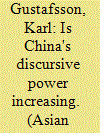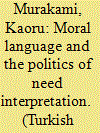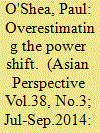| Srl | Item |
| 1 |
ID:
133967


|
|
|
|
|
| Publication |
2014.
|
| Summary/Abstract |
The idea that China's rise, and more specifically its increased material capabilities, are about to produce a power shift in East Asia raises the question whether the Chinese government's ability to produce effects through discursive power has also increased. The government's use of discourses about China's war against Japan is a conspicuous example of attempts to exercise discursive power. Has China's ability to use the past for political purposes increased as its material capabilities have grown? To answer this question, I theorize on the use of discourses about the past on three levels-domestic, bilateral, and international. My analysis demonstrates that notwithstanding its increased material capabilities, the Chinese government's discursive power has actually decreased.
|
|
|
|
|
|
|
|
|
|
|
|
|
|
|
|
| 2 |
ID:
132523


|
|
|
|
|
| Publication |
2014.
|
| Summary/Abstract |
Liberal modernists have claimed that democracy requires participation by interested parties in the politics of need interpretation. Poor people, an interested party, may lack the rational and critical language essential for the process of interpretation. This paper discusses a different perspective on the language of participation by the poor. Focusing on the everyday practices of the poor and using information collected from ethnographic research in Sultanbeyli, a low-income district in Istanbul, Turkey, it is shown how discursive power constrains the language and the manner of talking that the poor use to articulate their needs. The people in the district, "former villagers bound to the Anatolian tradition" using religious morality as a justification of their demands, successfully negotiate with administrators of social assistance programs, thus participating directly in the politics of need interpretation.
|
|
|
|
|
|
|
|
|
|
|
|
|
|
|
|
| 3 |
ID:
133968


|
|
|
|
|
| Publication |
2014.
|
| Summary/Abstract |
In 2009 the Democratic Party of Japan came to power promising a foreign policy shift, aiming for a more equal relationship with the United States and improved relations with Japan's Asian neighbors. The policy shift was explicitly designed as a response to a perceived regional and global power shift from the United States to China. However, within nine months the new prime minister, Hatoyama Yukio, resigned, and his successors jettisoned the foreign policy shift. Conventional explanations cite the weak leadership of Hatoyama, the inexperience of his party, and the lack of realism behind the proposed policy shift itself as key factors in the shift's failure. In this article I provide an alternative perspective. Drawing on the concept of discursive power, I demonstrate how Washington turned the Futenma base relocation and other issues into a major crisis in Japan-US relations in order to discredit Hatoyama and the policy shift. What was arguably a modest and pragmatic policy shift was narrated as a grave threat to the very cornerstone of postwar Japanese security. By focusing on the US exercise of discursive power over Japan, I suggest that talk of an East Asian power shift is premature.
|
|
|
|
|
|
|
|
|
|
|
|
|
|
|
|
| 4 |
ID:
143339


|
|
|
|
|
| Summary/Abstract |
This paper critically examines the discursive power of the International Criminal Court (ICC), which was established in 2002 with unprecedented jurisdiction in terms of both crimes being prosecuted and territorial scope. What evokes a critical engagement is not only the criminalization of certain acts in international law, but also the evolution of a permanent international criminal court with forms of power enabling the sanctioning, prosecution and punishment of these acts. Analysing how current international criminal law developed and is being shaped brings to the surface particular power structures embedded in legal texts and practices. By subjecting the discourse of the ICC to a Foucauldian analysis and arguing for the utility of Foucault’s concepts in analysing contemporary international criminal legal discourse, the paper contributes to our understanding of novel techniques and procedures of contemporary global governmentality, and how the ‘international community’ is constituted as both a subject and an object within this recent power modality.
|
|
|
|
|
|
|
|
|
|
|
|
|
|
|
|